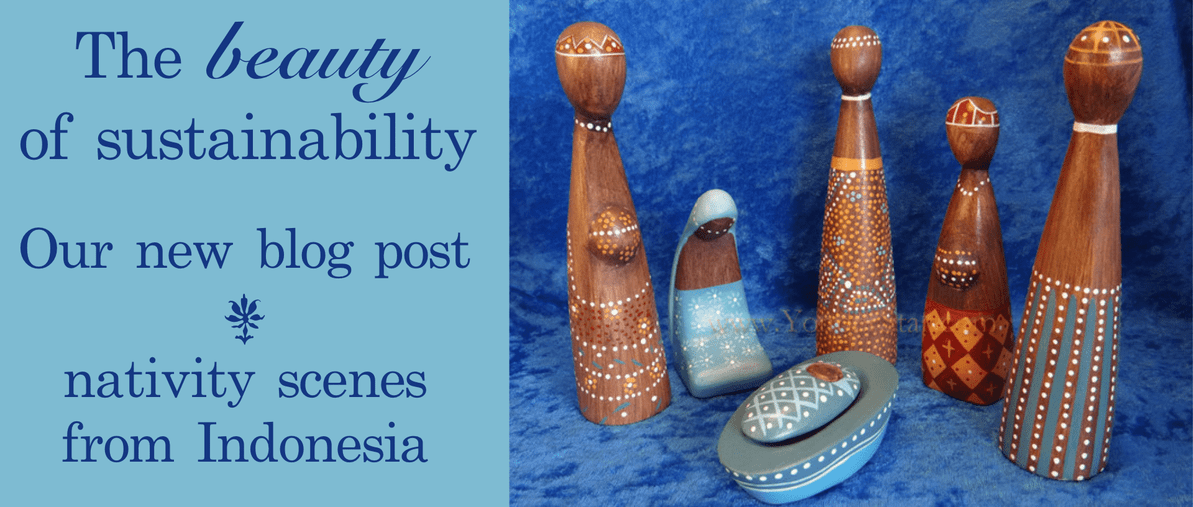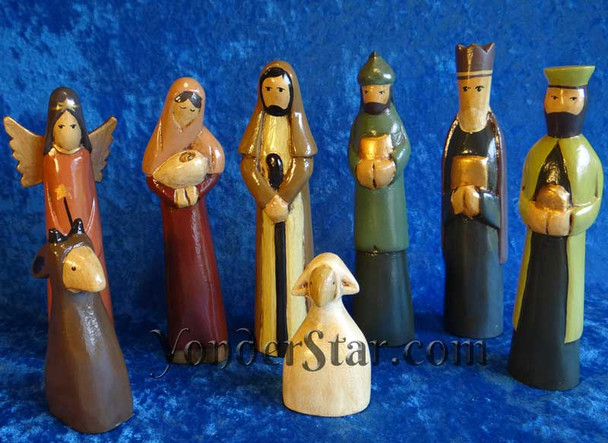The Beauty of Sustainability: Hand-Carved Nativity Sets from Indonesia
Sustainable Use of Acacia, Alstonia, and Albizia Wood in Indonesian Nativity Sets
May 28, 2024 by Cynthia Snyder
Indonesia is renowned for its exquisite hand-carved wooden objects, which reflect the country's rich cultural heritage and skilled craftsmanship. Among the popular types of wood used in these traditional creations are acacia, alstonia, and albizia. These woods are not only chosen for their aesthetic appeal and workability but also for their potential for sustainable use.
Acacia Wood

Using acacia wood in hand-carved objects supports sustainable forestry practices. Artisans who use sustainably sourced acacia wood contribute to the conservation of natural forests by providing a market for responsibly harvested timber. This practice helps prevent deforestation and promotes the health of forest ecosystems.
See more nativity scenes from Indonesia.
Alstonia Wood
Alstonia wood, also known as pulai, is another popular choice among Indonesian woodcarvers. This light, softwood is prized for its ease of carving and smooth finish. Alstonia trees grow quickly and are often found in secondary forests, making them a sustainable choice for artisans.
Sustainable use of alstonia wood involves selecting trees that are mature enough for harvesting while ensuring that young trees are left to grow. This selective harvesting method helps maintain forest cover and biodiversity. Additionally, promoting the use of alstonia wood in crafts encourages the planting and maintenance of these trees, which can help restore degraded lands.
Albizia Wood
Albizia wood, sourced from the fast-growing albizia tree, is known for its lightweight and fine texture, making it ideal for detailed carvings. Albizia trees are often planted as part of reforestation and agroforestry projects because they improve soil fertility and prevent erosion.
The use of albizia wood in hand-carved objects supports reforestation efforts and sustainable land management practices. By purchasing albizia wood products, consumers help create a demand for this eco-friendly material, encouraging more farmers to plant albizia trees and contribute to environmental conservation.
See more nativity scenes from Indonesia.
The Importance of Buying Fair Trade Nativity Sets from Indonesia
Fair trade is crucial in ensuring that the artisans who create these beautiful hand-carved objects receive fair compensation for their work. Fair trade practices prioritize equitable trading conditions, respect for workers' rights, and sustainable environmental practices.
By supporting fair trade items from Indonesia, consumers can:
- Empower Artisans: Fair trade ensures that artisans are paid fairly for their craftsmanship, allowing them to support their families and invest in their communities. This empowerment leads to improved living standards and the preservation of traditional skills.
- Promote Sustainable Practices: Fair trade organizations often emphasize environmental sustainability. By adhering to fair trade standards, artisans are encouraged to use sustainable materials and eco-friendly production methods, which helps protect Indonesia's rich biodiversity.
- Preserve Cultural Heritage: The demand for fair trade products helps keep traditional carving techniques alive. Artisans are motivated to continue their craft, passing down their knowledge and skills to future generations.
- Ensure Ethical Consumerism: Consumers who choose fair trade nativity scenes are making a conscious decision to support ethical practices. This not only benefits the artisans but also promotes a global movement towards more responsible consumption.
The sustainable use of acacia, alstonia, and albizia wood in Indonesian hand-carved nativity sets highlights the importance of responsible forestry and environmental stewardship. Coupled with fair trade practices, these efforts ensure that the artisans behind these creations are treated with dignity and respect. By choosing sustainably sourced and fair trade products, consumers can contribute to the well-being of both people and the planet, fostering a more just and sustainable world.
Recent Posts
-
The Beauty of Sustainability: Hand-Carved Nativity Sets from Indonesia
Sustainable Use of Acacia, Alstonia, and Albizia Wood in Indonesian Nativity SetsMay 28, 2024 b …May 28th 2024 -
Haiti's Vibrant World of Metal Art
Haiti's Vibrant World of Metal Art I was curious about Haiti's history of metal work and found fas …Mar 19th 2024 -
Tips for Purchasing an Outdoor Nativity Scene
Tips for Purchasing an Outdoor Nativity Scene Published on: November 7, 2023 An outdoor nati …Nov 7th 2023






